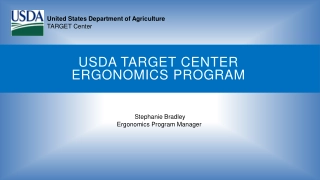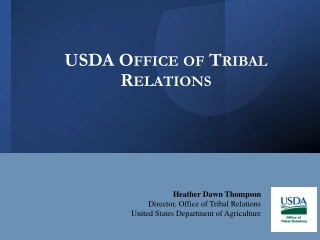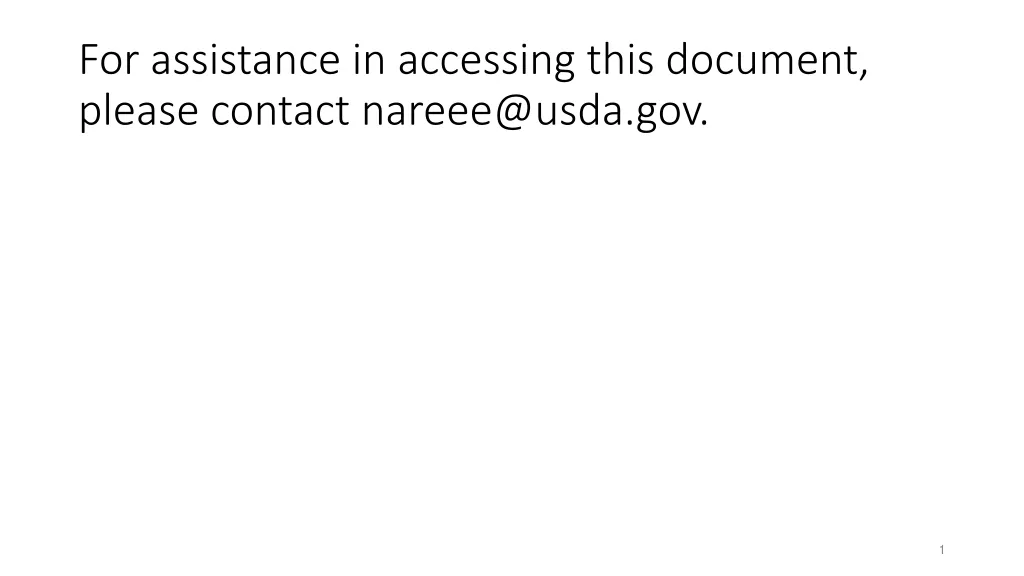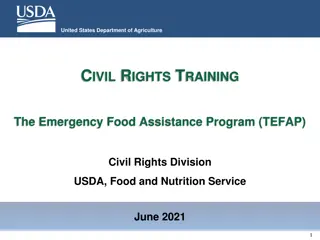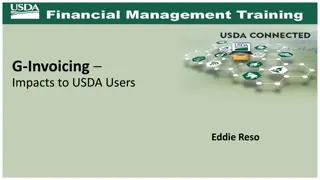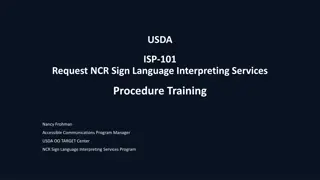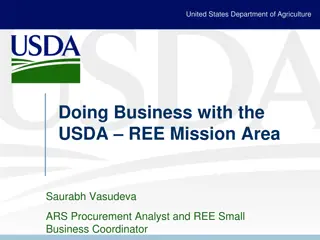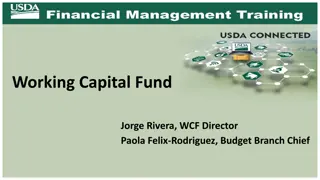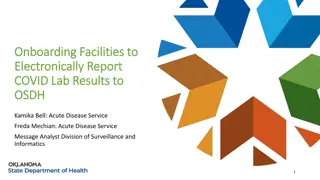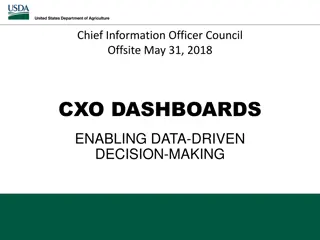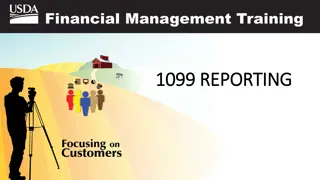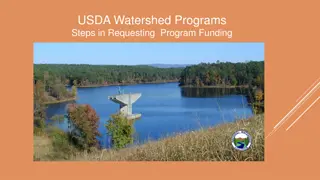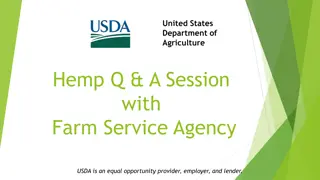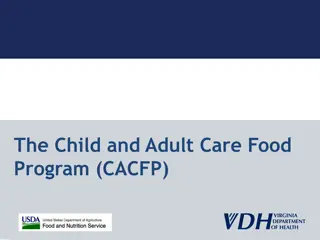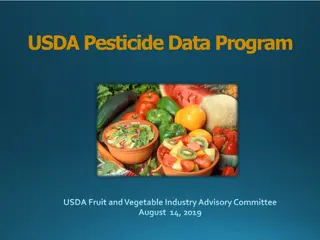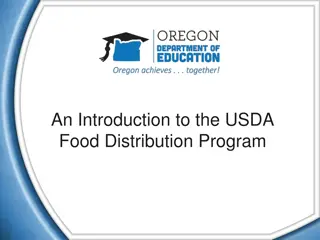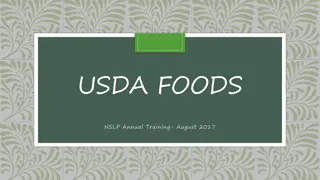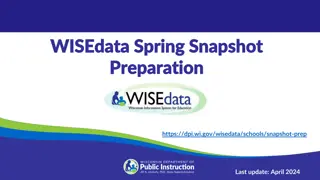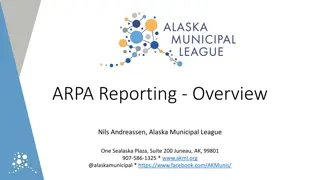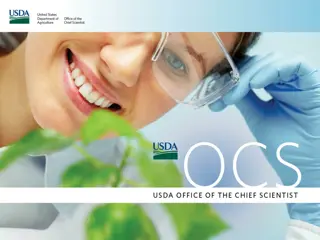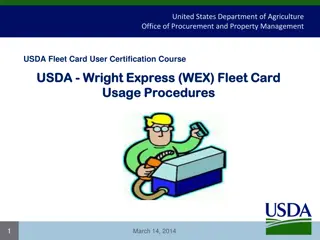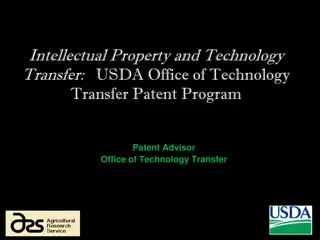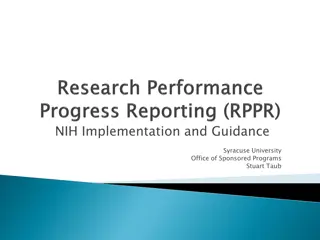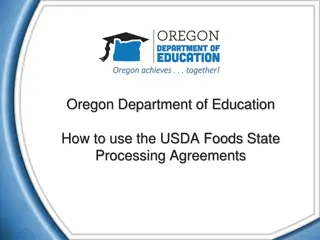USDA TARGET CENTER ERGONOMICS PROGRAM
Workplace ergonomics and the USDA TARGET Center's program for improving workplace health and productivity. Understand risk factors, prevention principles, and resources available for ergonomic support.
0 views • 37 slides
USDA Tribal Relations and Federal Policy in Native Agriculture
Explore the role of the USDA Office of Tribal Relations and the USDA Tribal Advisory Committee in addressing barriers and federal policies impacting tribal agriculture. Learn about tribal eligibility, statutory requirements, and the historical eras of federal Indian policy affecting Native American
0 views • 36 slides
Streamlined Forecasting for Future USDA Foods Utilization
Cathy Sparks, National Commodity Director, discusses the importance of communication in the forecasting process for USDA foods. Tools like the ProcessorLink calculator and K12 On Target planner help processors and distributors estimate quantities needed for production. Commodity Planning Made Easy s
1 views • 9 slides
USDA DEIA Strategic Plan Overview
The United States Department of Agriculture (USDA) is prioritizing Diversity, Equity, Inclusion, and Accessibility (DEIA) through various initiatives and actions. The agency is focused on promoting a diverse workforce, ensuring equitable access to programs, and fostering an inclusive workplace envir
1 views • 12 slides
ECC Social Value Reporting and Evaluation Framework
Essex County Council (ECC) has implemented a robust Social Value Reporting and Evaluation framework based on the Local Government Association's National TOMs method. This framework categorizes and assesses social value contributions in two parts - Value Score and Supporting Statement Score - to deri
3 views • 16 slides
USDA Accessible Communications Program Overview
Advancing access and equity for individuals with disabilities is a key focus of the USDA Accessible Communications Program. Through initiatives like the National Disability Employment Awareness Month events and implementing the Rehabilitation Act, the program aims to promote accessible communication
5 views • 28 slides
Building a Trauma-Informed Workplace for Equitable Employment: USDA Symposium 2023
Explore the imperative of creating trauma-informed workplaces at the National Disability Employment Awareness Month Symposium hosted by USDA Target Center. The event sheds light on the prevalence of workplace trauma, its impact on mental health, and steps to advance access and equity. Gain insights
2 views • 36 slides
Effective USDA Foods Procurement and Forecasting Strategies
Managing USDA Foods procurement involves analyzing historical data, estimating future trends, and streamlining menu planning to save time and reduce costs. Standardized recipes and inventory management are crucial for efficient operations. Understanding the location and value of USDA Foods, along wi
8 views • 11 slides
Ongoing USDA Programs and Biotechnology Research Overview
This overview delves into ongoing USDA programs such as the Biotechnology Risk Assessment Grants (BRAG) Program, which supports biotechnology research. The program covers risk assessment, management, pollen flow research, gene transfer control methods, and more. Additionally, voluntary market facili
0 views • 16 slides
USDA Civil Rights Training for TEFAP Program
The USDA Civil Rights Training emphasizes the importance of training for state agencies, subrecipient agencies, frontline staff, and volunteers involved in the Emergency Food Assistance Program (TEFAP). It covers various aspects of Civil Rights compliance, including public notification, complaint pr
0 views • 48 slides
New Employee Benefits Overview for USDA APHIS and AMS Employees
Get insights into the array of benefits available for eligible employees of USDA APHIS and AMS, including details on life insurance, health insurance, dental and vision insurance, flexible spending accounts, retirement plans, and more. Understand eligibility criteria based on appointment types and w
0 views • 24 slides
Understanding G-Invoicing Implementation at USDA
G-Invoicing is an online portal facilitating electronic information exchange for interagency agreements among Federal agencies. The system streamlines invoicing processes, standardizes transactions, and enhances communication for reimbursable activities. The implementation at USDA involves mandatory
0 views • 26 slides
USDA In-Person Sign Language Interpreting Services Training Overview
This training session provides essential information for USDA employees on requesting in-person and virtual sign language interpreting services in the National Capital Region. It covers policy reviews, training completion, requesting procedures, and resources available through the USDA NCR Sign Lang
0 views • 23 slides
USDA REE Mission Area Overview and Procurement Guidelines
The United States Department of Agriculture's Research, Education, and Economics (REE) mission area comprises four agencies dedicated to enhancing the food and fiber system. The REE agencies facilitate procurements for various services and equipment, striving to achieve small business participation
1 views • 11 slides
Understanding the Working Capital Fund: Governance, Services, and Structure
The Working Capital Fund (WCF), established in 1944, is a fund without fiscal year limitation that supports centrally-managed Activity Centers providing various services such as Information Technology, Financial Management, and Administrative Services to USDA and Non-USDA organizations. The WCF empl
0 views • 11 slides
Streamlining Electronic Reporting of COVID Lab Results to OSDH
This documentation outlines the process of electronically reporting COVID lab results to the Oklahoma State Department of Health (OSDH). It covers the purpose, available options, specifications, formats, and the onboarding and testing process, aiming to accelerate the reporting of healthcare facilit
0 views • 9 slides
USDA CXO Dashboards for Data-Driven Decision-Making
This document outlines the progress and plans for implementing CXO Dashboards within the USDA to enable data-driven decisions. It covers the purpose, accomplishments, current status, timeline, and risk assessment of the project. Key highlights include the development of executive and OCIO dashboards
0 views • 9 slides
Overview of 1099 Reporting Systems
The 1099 Reporting Systems consist of MINC, EARN, and SPPS, which are used for IRS 1099 reporting purposes. These systems handle transactions and generate Form 1099 for recipients based on predefined criteria. Taxpayers are responsible for accurate reporting to the IRS, with reporting thresholds set
0 views • 15 slides
Understanding USDA Watershed Programs for Local Communities
USDA Watershed Programs offer assistance in addressing natural resource issues such as flood control, repairing flood damages, and rehabilitating flood control dams. The three major components - Emergency Watershed Program (EWP), Watershed Protection and Flood Control Program (WPFO), and Watershed R
0 views • 15 slides
Hemp Acreage Reporting & Certification Q&A with USDA
Explore essential information about Hemp Acreage Reporting, Certification, and compliance procedures in this Q&A session with the Farm Service Agency (USDA). Learn about important deadlines, required documentation, and the significance of reporting accuracy for various programs. Discover how to file
0 views • 15 slides
UNEP Support for Improving UNCCD Reporting Procedures
UNEP has been providing support since 2010 to enhance the reporting processes of the UNCCD, focusing on streamlined funding approaches, technical assistance, and capacity building. Key outcomes include the development of reporting tools, online reporting systems, and building credible data from coun
0 views • 14 slides
Climate Change Monitoring, Reporting, and Verification (MRV) Training Session Overview
This document outlines the purpose and reporting requirements for the development of a Climate Change Monitoring, Reporting, and Verification (MRV) system, focusing on projections and scenarios. It highlights the importance of collecting information for climate mitigation, assisting Serbia in meetin
0 views • 19 slides
Overview of Child and Adult Care Food Program (CACFP)
The Child and Adult Care Food Program (CACFP) is a federally funded program aimed at subsidizing eligible institutions to provide nutritious meals to children and adults, promoting lifelong healthy eating and physical activity habits. Administered by the USDA and implemented by various programs, CAC
0 views • 21 slides
Transitioning to Incident-Based Crime Reporting: Enhancing Transparency and Accountability
Anytown Police Department (APD) is leading the transition from Summary Reporting to Incident-Based Reporting through the National Incident-Based Reporting System (NIBRS). This change promotes transparency, provides detailed crime data to the public, and improves statewide and national crime statisti
3 views • 17 slides
Insights into Structured Reporting Practices in Colorectal Cancer Imaging
A survey conducted by Dr. Eric Loveday at North Bristol NHS Trust revealed the current landscape of structured reporting in MRI and CT scans for rectal and colon cancer. Results indicate a positive outlook towards implementing national standards for structured radiology reporting, with an emphasis o
0 views • 7 slides
USDA Pesticide Data Program Overview
The USDA Pesticide Data Program (PDP) provides high-quality pesticide residue data for US foods to support regulatory decision-making and ensure food safety. Through cooperative agreements with participating states, the program conducts sampling of various commodities, including fresh fruits and veg
0 views • 17 slides
Overview of USDA Food Distribution Program
The USDA Food Distribution Program aims to support American agricultural markets and provide nutritious food to schools. With over 17 million entitlements distributed annually, the program ensures that USDA foods are domestic and meet nutritional goals. Service fees cover various administrative cost
0 views • 15 slides
Identifying USDA Grade for Exterior Egg Shell Quality
This content presents images of individual eggs and asks users to place the USDA grade for each egg's exterior shell quality. The images provide a visual assessment challenge for viewers to gauge shell quality based on USDA standards.
0 views • 15 slides
Simpler Systems Reporting Pilot for Financial Data Enhancement
The Simpler Systems Reporting Pilot is underway to enhance financial data reporting at the university campus. Led by Vice President Ryan Nesbit's team, this initiative aims to improve University-wide financial reporting mechanisms and accessibility to data through the Simpler tool. The pilot include
0 views • 5 slides
USDA Foods Program Overview: School Lunch Program Details
Schools and agencies participating in the National School Lunch Program can receive USDA Foods, with entitlement rates set annually by the USDA. The program includes direct and processed options, along with specific delivery schedules and administrative fees. Ordering takes place once a year, with o
0 views • 19 slides
Overview of WISEdata Snapshot Preparation and Reporting Requirements
The WISEdata Snapshot Preparation provides crucial details on data entry, validation, and reporting processes for educational institutions. It outlines the importance of accurate data collection for federal reporting, public reporting, and funding determinations. Additionally, the Snapshot Reporting
0 views • 41 slides
Ensuring Chemical Reporting and Preparedness at the DEQ
The Chemical Reporting and Preparedness section at the DEQ focuses on regulations under EPCRA, prompted by incidents like the Bhopal tragedy. EPCRA covers Tier II reporting, spill reporting, LEPCs, State Emergency Response Commission, and Oklahoma Hazardous Materials Emergency Response Commission. T
0 views • 17 slides
ARPA Reporting Overview and SLFRF Guidelines in Alaska
This document outlines the reporting overview for the ARPA (American Rescue Plan Act) and specific guidelines for the Coronavirus State and Local Fiscal Recovery Fund (SLFRF) in Alaska. It covers acceptance, use, and reporting of funds, as well as designating staff roles for managing reports. The co
2 views • 22 slides
Feedback Analysis on Medication Incident Reporting in Hospitals
Feedback received from IMSN members on NIMS and incident reporting revealed various issues affecting the rates at which staff report medication incidents/near misses within hospitals. Major themes included staffing numbers and turnover, pharmacist involvement in incident reporting, clinical pharmacy
0 views • 12 slides
Importance of Wildland Fire Reporting to the Fire Community
Wildland fire reporting plays a critical role in providing accurate data for effective fire management. Defined state fires and challenges in reporting impact funding, risk management, and agency support. Comprehensive reporting like the Wildland Fire Occurrence Reporting for Massachusetts is essent
0 views • 6 slides
USDA Office of the Chief Scientist Overview
The USDA Office of the Chief Scientist (OCS) plays a crucial role in facilitating scientific coordination and collaboration across USDA agencies. It comprises a structured organizational setup with key positions dedicated to scientific integrity, communication, and coordination. The Acting Chief Sci
0 views • 12 slides
USDA Fleet Card Program Usage Procedures
The United States Department of Agriculture (USDA) outlines the procedures and guidelines for using the USDA-authorized Wright Express (WEX) Fleet Card for fuel, maintenance, and repair services for USDA-owned and commercially-leased vehicles. The program covers specific authorized uses such as fuel
0 views • 12 slides
USDA Office of Technology Transfer Patent Program Overview
USDA Office of Technology Transfer's Patent Program provides professional services for creating, managing, and convening Utility Patent Review Committees, preparing and prosecuting U.S. patent applications, advising on patent policies, and facilitating foreign filings. The process for protecting USD
0 views • 24 slides
Streamlining Research Progress Reporting for NIH Awards
Research Performance Progress Report (RPPR) is a standardized mechanism to facilitate interim progress reporting for NIH-funded projects, aiming to enhance consistency and minimize administrative burdens. It replaces the eSNAP process for certain types of awards and fellowship grants. RPPR includes
0 views • 12 slides
Understanding USDA Foods State Processing Agreements in Oregon
The Oregon Department of Education works with state distributing agencies and school districts to leverage USDA Foods and convert them into convenient end products through processing agreements. Various levels of government can make regulations regarding nonprofit food service accounts, ensuring com
0 views • 13 slides
